22+ SAMPLE Executive Coaching Agreement
-
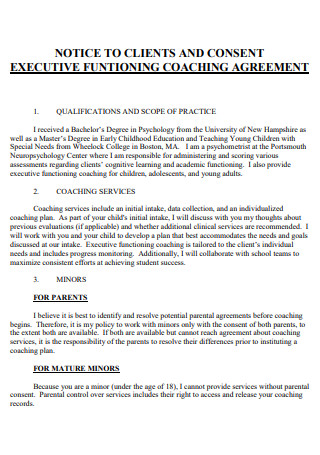
Executive Functioning Coaching Agreement
download now -
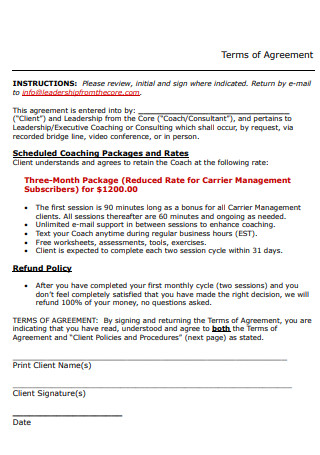
Executive Life Coaching Agreement
download now -
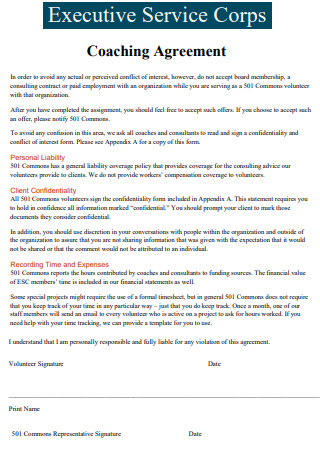
Executive Service Corps Coaching Agreement
download now -
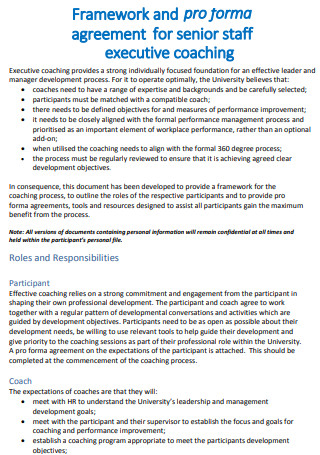
Proforma Agreement for Senior Staff Executive Coaching
download now -
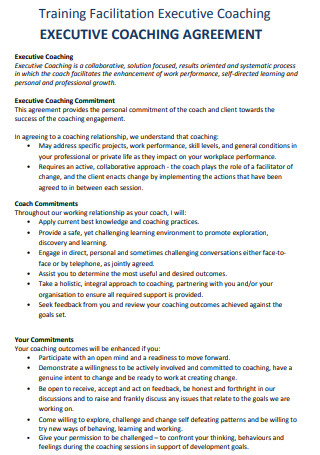
Training Facilitation Executive Coaching Agreement
download now -
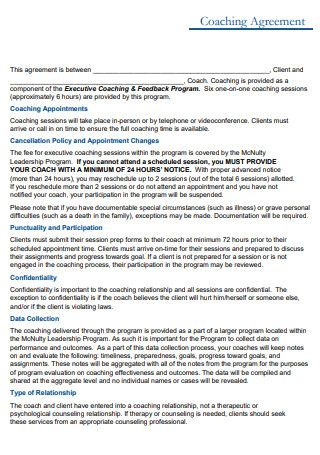
Executive Coaching Agreement
download now -
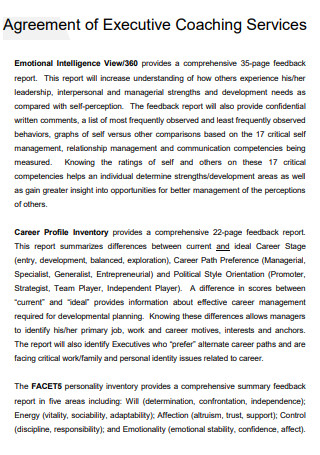
Executive Coaching Services Agreement
download now -
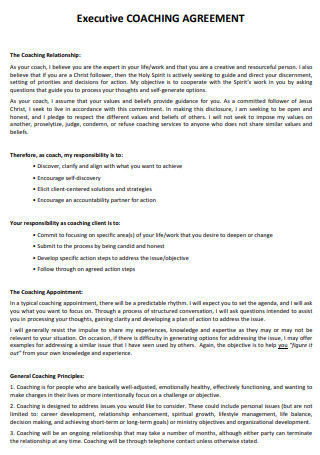
Executive Coaching Agreement Example
download now -
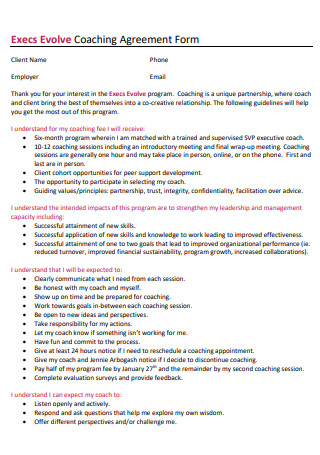
Executive Coaching Agreement Form
download now -
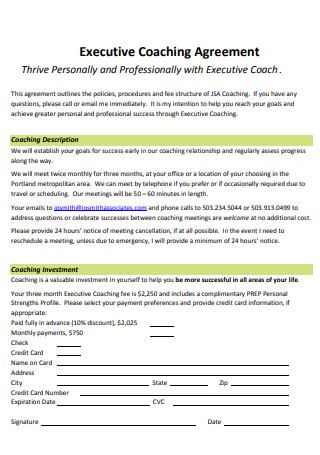
Professional Executive Coaching Agreement
download now -
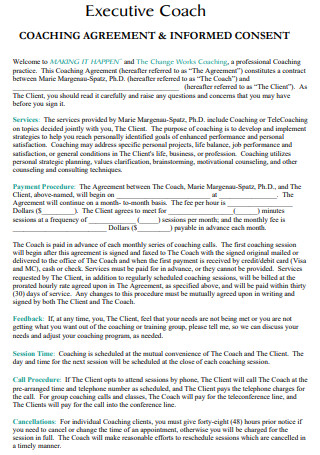
Executive Coaching Agreement And Informed Consent
download now -
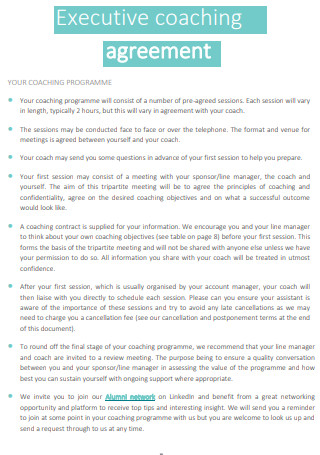
Executive Coaching Agreement Template
download now -
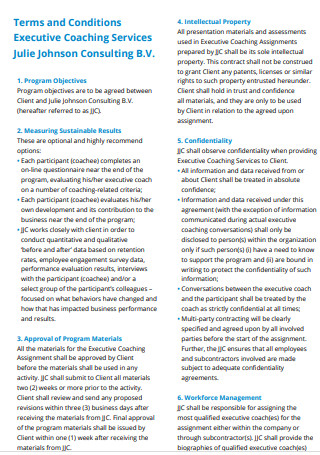
General Executive Coaching Agreement
download now -
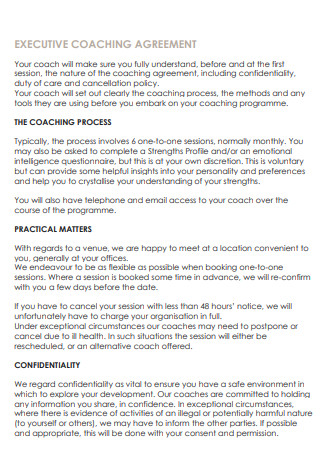
Simple Executive Coaching Agreement
download now -
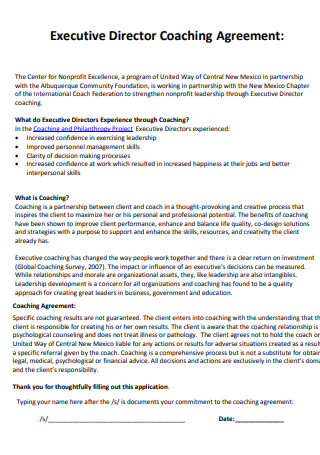
Executive Director Coaching Agreement
download now -
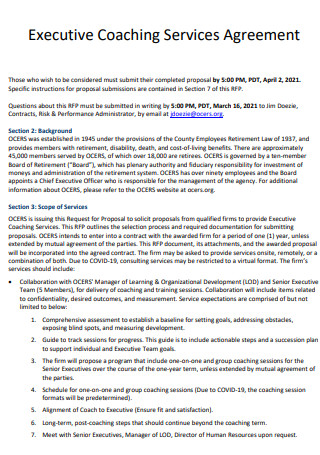
Basic Executive Coaching Agreement
download now -
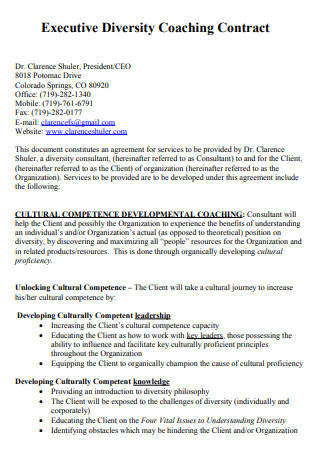
Executive Diversity Coaching Agreement
download now -
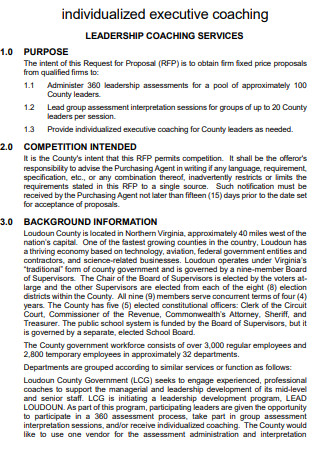
Executive Leadership Coaching Services Agreement
download now -
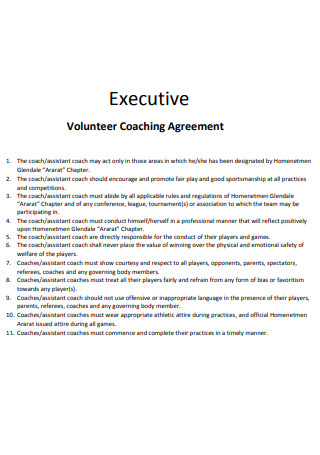
Executive Volunteer Coaching Agreement
download now -
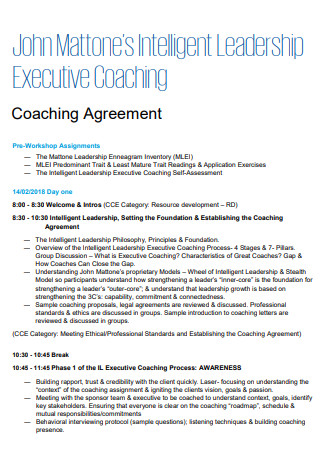
Executive Intelligence Coaching Agreement
download now -
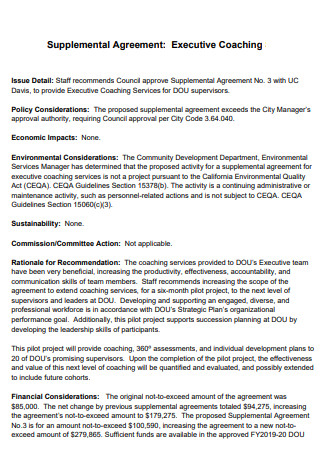
Executive Coaching Supplement Agreement
download now -
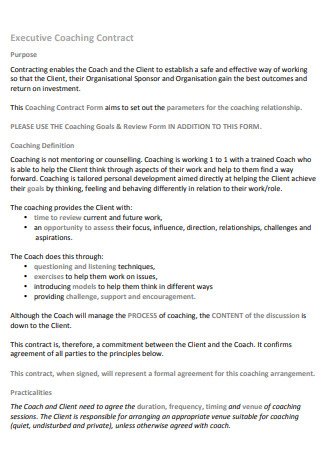
Executive Coaching Agreement in PDF
download now -
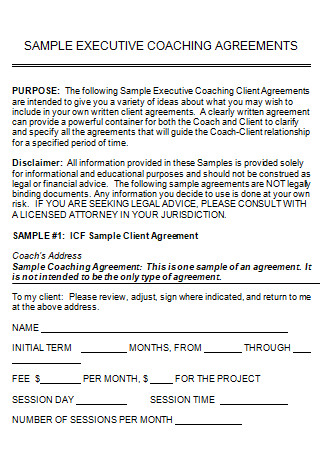
Executive Coaching Agreement in DOC
download now
FREE Executive Coaching Agreement s to Download
22+ SAMPLE Executive Coaching Agreement
What Is an Executive Coaching Agreement?
Benefits of Executive Coaching
Tips for Starting Executive Coaches
How to Improve Your Executive Coaching Skills
FAQs
Is an executive coach worth it?
Why do companies hire executive coaches?
How do I choose an executive coach?
What Is an Executive Coaching Agreement?
Executive coaching contracts establish the primary client relationship and achieve the desired client outcome over several sessions spanning weeks to months. This is the most visible stage of contraction. This contract is an essential step in developing this necessary expertise. Before moving on to the service aspect of coaching, it is vital to establish clear and open communication by describing the type of coaching, establishing expected behavior, and defining payment/duration of service terminology. According to a study by Metrix Global, executive coaching has a return on investment (ROI) of 788 percent due to increased productivity and employee retention.
Benefits of Executive Coaching
It depends on what you do; the benefits of executive coaching can vary depending on the areas where you need assistance.
Executive coaching is synonymous with leadership coaching, not limited to a large organization’s CEO or senior vice president. Executive coaching focuses on assisting individuals in any leadership position within organizations, large or small, who wish to increase their leadership potential and acquire the necessary leadership skills to advance their businesses and careers. Whether you are a company owner seeking to increase workplace productivity or a newly promoted manager in need of assistance becoming role-ready, executive coaching is a proven method for maximizing individual and organizational potential. Executive coaching has eight benefits, whether you are a CEO needing coaching for your employees or an individual in a leadership position seeking to maximize your potential.
Tips for Starting Executive Coaches
Due to the numerous responsibilities of the position, being an executive can be a significant source of stress in the business world. It is, therefore, common for individuals to seek the services of an executive coach. The role of a coach is not to perform the executive’s duties but to hone their skills and enable them to meet their goals or overcome a challenge. If you are in the process of becoming an executive coach or are new to this field, the following advice will help you establish yourself as an executive coach and gain confidence in your practice.
1. Utilize your analytical skills.
All the skills you’ve acquired during your years as a business leader are essential to your new position as a coach. However, please do not assume that these skills are sufficient on their own; you must be able to apply them when necessary optimally. For this reason, it is essential in your coaching position to develop your analytical mind, which will enable you to identify the specific areas where action is required. You want to put your skills to the best use for your customers and provide them with pertinent advice. Being able to analyze something also requires good listening skills. Consider what your customers value after hearing what they have to say.
2. Be curious and receptive.
If you’ve decided to pursue a job in executive coaching, you likely have a passion for corporate culture and management. If so, do not be reluctant to display it. Do not conceal your interest in the diverse goals of your customers. Remember that you are there to assist them in achieving these objectives; for that, you and they must communicate openly. Dare to be inquisitive, do not hesitate to ask questions, and demonstrate that you are as invested in the executive’s success as they are. This creates trust between you and the executive being coached, and as a result, you will be able to move forward more effectively together. Keep in mind that being curious and having an open mind go hand in hand. Therefore, listen to others without judging them. It may hinder your coaching process if you do so.
3. Develop your understanding of pedagogy.
As an executive coach, you are there to instruct and share your knowledge with your client. In any training profession, there is a significant gap between knowledge and the ability to impart it. Even if a person is the most qualified in his field and knows everything about his discipline, he can still be a poor teacher if he lacks a sense of pedagogy. Always place yourself in a dynamic of transmission and learning.
4. Be intelligent.
To be perceptive, you must know which of your skills to utilize to provide an effective solution or recommendation when your customers describe the obstacles they are attempting to overcome. This is consistent with your analytical nature. Do not operate in an overly academic manner by simply regurgitating your knowledge. Your recommendations should hit the mark and even surprise your clients. Your coaching will be ineffective if you tell them things that they already know or have investigated on their own. Instead, please give them a concrete perspective they hadn’t considered to equip them for success. Consider analyzing the situation from all angles. The solution your customers seek may be concealed. As a coach, you must help them locate it.
How to Improve Your Executive Coaching Skills
Today, the world is changing literally before our eyes. Those who do not wish to be left behind must change as well. Therefore, if your coaching style hasn’t changed over the years, it’s likely that you’ll gain from revisiting your process and identifying areas where it could be enhanced. Coaching is an effective method for fostering the growth and development of others. To maximize your coaching potential, you must continually reevaluate your coaching skills. Here are six ideas you can return to whenever you consider ways to improve your coaching practice.
1. Never stop learning
Learning is a lifetime endeavor. If you are not continuously improving, is your coaching business stagnating? Due to the Internet, the variety and depth of available educational opportunities are virtually limitless. Numerous educational opportunities are available, from online conferences to one-day workshops to university courses, creative newsletters, podcasts, websites, and YouTube. In the process of coaching, you should set an example. Whether you’re instructing on management development or leadership skills, you should always have recent examples and case studies to support your advice. Establish a learning budget and make it a priority.
2. Find an advisor for yourself.
Being a coach does not automatically qualify one as an all-knowing expert capable of solving any problem. Coaches require coaches as well. You must be able to ask someone questions and view the situation from a different angle. Being a coachee will make you a better coach in the future.
3. Establish clear expectations with your clients.
Coaching involves more than a simple conversation. Each session has a distinct and long-term objective your clients seek to achieve. For any coaching methodology to be effective, you must establish mutually agreeable expectations with the client. Only then can you create a plan to assist their improvement. Your client should also be able to revisit their goals and vision as their priorities evolve.
4. Create a model for your coaching sessions.
The best coaches utilize one or more models to keep their sessions structured and efficient. Models are situational and provide time-tested tools for performance enhancement. Leadership coaching models can be distinct from employee coaching models. Over the past twenty years, GROW has been widely utilized in corporate and executive coaching. However, there are dozens of other models for coaching in any field. SMART goals, for instance, can assist you in developing goals that are specific, measurable, attainable, relevant, and time-bound. Knowing several coaching models and switching between them will immediately impact your versatility as a coach. Additionally, consider how you can modify the sessions to provide your clients with greater flexibility. A five-minute phone call can often accomplish as much as a two-hour meeting.
5. Practice active listening
If there is one skill that can serve as the cornerstone of effective coaching, it is active listening. Active listening entails avoiding distractions and refraining from planning your following statement while clients speak. Listening attentively to your clients fosters trust and encourages them to open up. It can even reveal what customers are not saying (by watching their body language).
6. Solicit input from your customers.
Obtaining timely feedback from your clients is one of the most efficient ways to enhance your coaching abilities. The feedback process can be as straightforward as asking a few questions after each session or sending an anonymous survey reports to all clients every few months. Discuss the feedback you receive with your coach and develop actionable steps to improve the effectiveness of your coaching conversations.
FAQs
Is an executive coach worth it?
A coach with extensive knowledge of organizational behavior and rigorous psychological training will achieve the best results. When executed effectively, executive coaching is a potent and rewarding tool for enhancing the performance of executives and their organizations, and the investment will likely be well worth it.
Why do companies hire executive coaches?
Companies hire executive coaches to develop the skills of their high-potential team members and address top-level executives’ behavior that may be sabotaging the organization’s success.
How do I choose an executive coach?
Look for a coach with a business or other relevant degree and, ideally, industry experience. A good coach has experience coaching real executives in actual companies and can provide reference lists and testimonials to attest to their expertise and capacity to produce results for coaching clients.
Contracts are fundamentally protections for both the coach and the client. Legal protection prevents problems from arising and disrupting the coaching organization. Download our easily customizable and comprehensive templates today!
